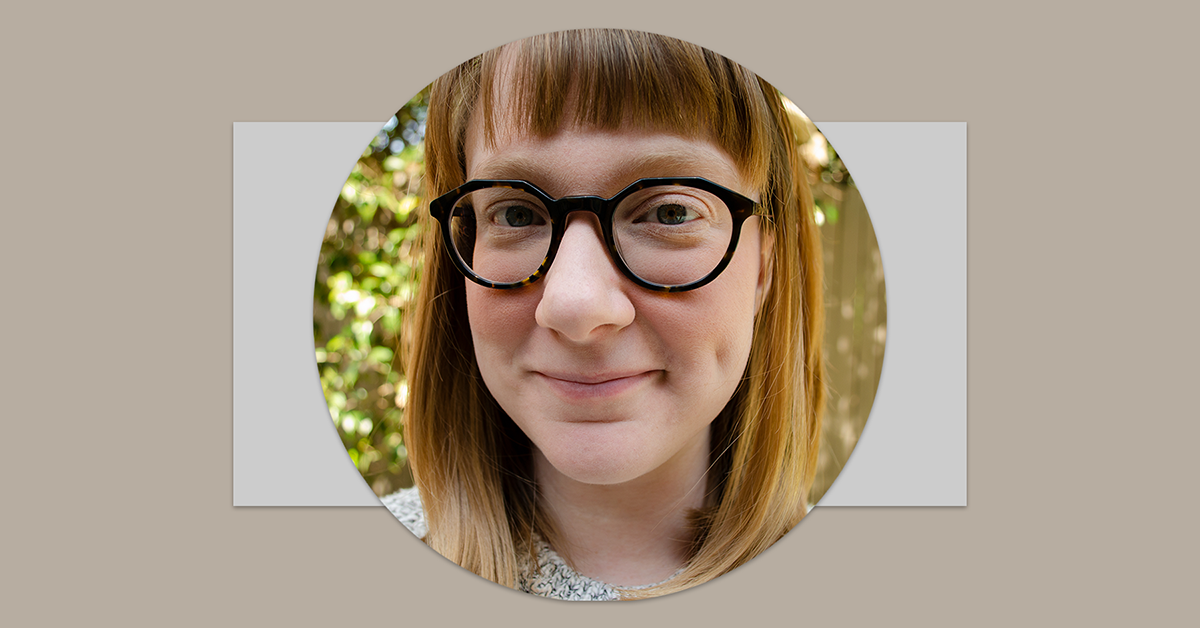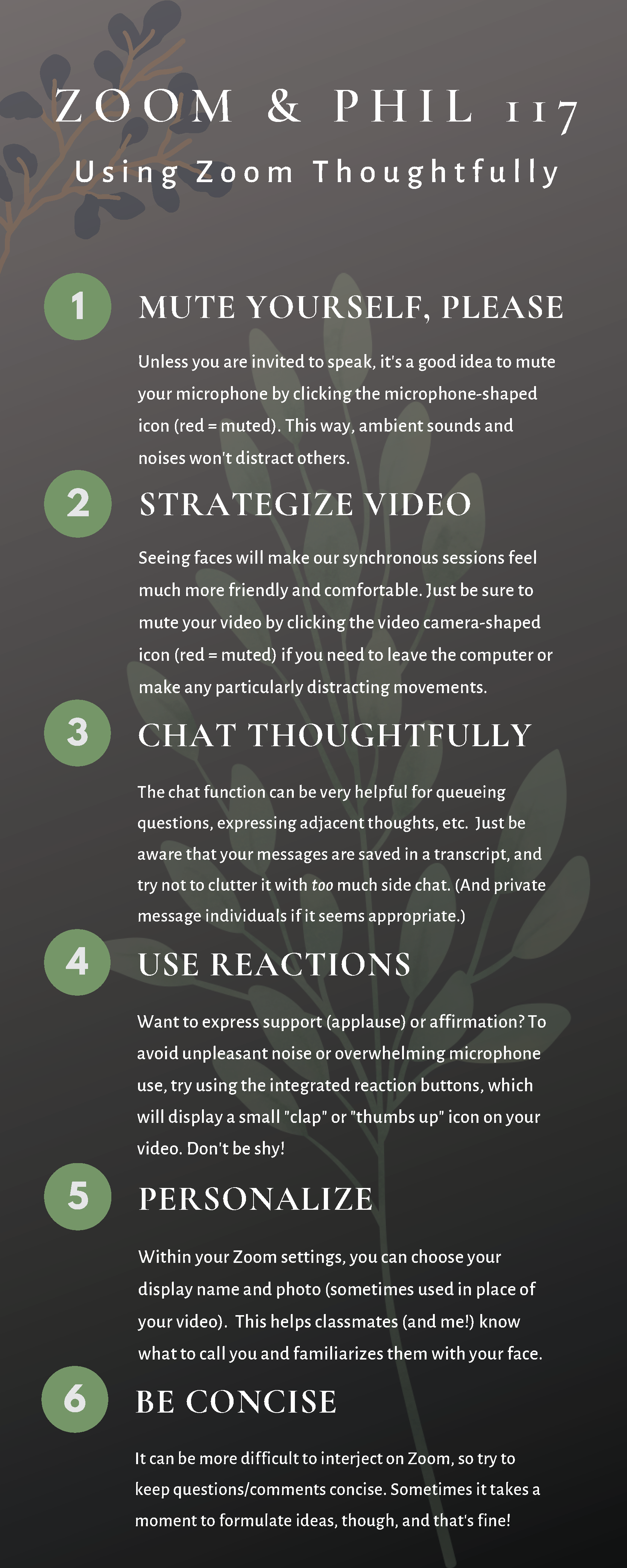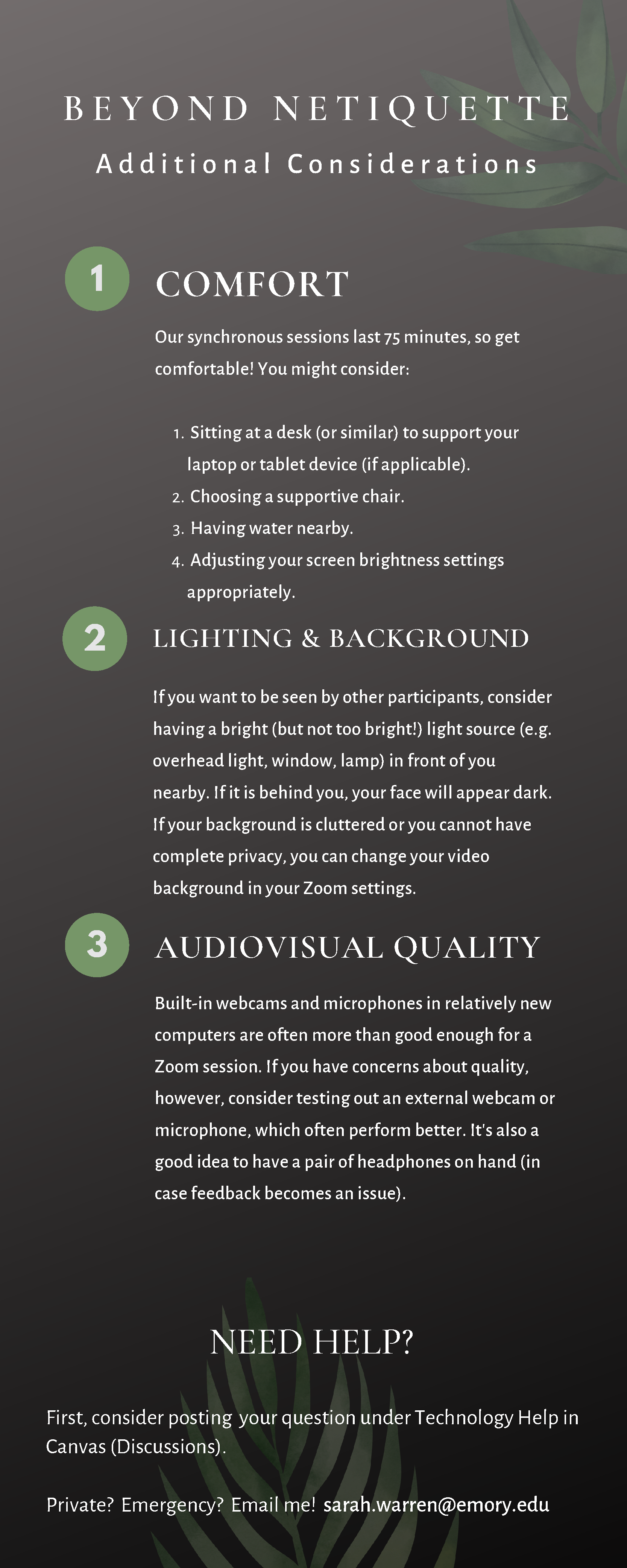This reflection post is part of a series by staff members of the Emory Center for Digital Scholarship (ECDS) about online teaching during the COVID-19 pandemic. Sarah Warren was the 2019-2020 David R. Scott Fellow at ECDS and is currently a PhD candidate in Philosophy. She was a facilitator of Emory College Online Teaching Strategies (ECOTS) during Summer 2020.
by Sarah Warren

I love digital scholarship, and I love online teaching.
These two practices are distinct—and cannot be collapsed into each other—but both are rooted in similar experiences and values for me. Growing up in rural Ontario, the Internet was a precious, scarce, almost sublime sort of phenomenon. My first job (aside from the obligatory paper route) was as an amateur web designer, and my first contract earned me a shiny new desktop computer of my own. I was fascinated by the possibilities of virtual experience: it seemed to me that the Internet promised the riches of offline sociality, but with greater intentionality than is possible in-person—intentionality in design, intentionality in discussion—and was laced with the colour of creative vision, not to mention the sheer volume of information.
Pursuing digital scholarship was then a natural progression for me as I moved through my formal education. Philosophical literature presses me to examine, reflect, and critique; digital scholarship proposes new ways of putting these concepts into flight, providing new forums for the cross-pollination of ideas, unorthodox styles of collecting, interpreting, and displaying data. Once we get into the dissemination and development of ideas, of course, we inch closer to the domain of pedagogy. As an instructor, I found myself asking myself, ‘Is the traditional lecture always the best way to teach? Why should I avoid leveraging my familiarity with interactive tools that—with a bit of forethought and imagination—could provoke more engagement and make class more memorable?’ I’ve come to the conclusion that the answer is quite simple: it isn’t, and you shouldn’t. My reflections on this were prompted in part by my participation in the Emory Foundations for Online Teaching (EFOT) course, which in turn greatly influenced my strategy for acting as a facilitator for the Emory College Online Teaching Strategies (ECOTS) course.
EFOT is a badge-based module series; the session in which I participated was taught by Christopher Adamson, former Digital Scholarship Associate at ECDS (now Education Technology Integrationist at the University of South Dakota), in partnership with the Center for Faculty Development and Excellence (CFDE). EFOT reinforces the idea that teaching online presents unique and valuable learning opportunities for all involved parties, yet is a skill that requires training in both principles of pedagogy and the technologies that can help realize these pedagogical goals. Over the course of almost a year, EFOT participants worked closely alongside experts in online teaching to learn the ins and outs of Canvas (Emory’s Learning Management System) and supplementary tools like VoiceThread, ScholarBlogs (an ECDS resource), and more.
At the same time, we posed important questions about how these technologies might enhance or detract from learning goals, inclusive classrooms, and the social dimension of classroom learning. The trajectories traced by these questions and answers—concerns, gaps in student needs, flashes of inspiration—framed our perspectives throughout the course. We all started EFOT as passionate teachers and curious learners, wondering how digital technologies might work for us. We came to see how the shape of these technologies is dramatically influenced by what we bring to the table as instructors: the energy that we put into rethinking the connections between content and medium, teacher and student, and even the nature of scholarship itself. (You can read more about the ECDS’s EFOT course on our blog.)
COVID-19 dramatically changed the teaching landscape (literally) overnight. We did what we could to cultivate student success and, realistically, survive in a completely new world of Zoom calls and brimming inboxes. ECOTS is a way to make sure that online teaching does not remain “emergency” teaching: that instructors are given the opportunity to see first-hand how online teaching is not merely a simulacrum of “the real thing,” but is a unique mode or method with its own conditions for flourishing.
As an ECOTS facilitator, I worked with a variegated cohort of instructors with varying degrees of technological literacy and pedagogical styles. Some were initially skeptical about online teaching; they (understandably) mourned the loss of the lived experience of being with students, of perceiving and responding to the “atmospheric conditions” of learning by carefully attending to body language and tone. Even those who were more open to our newfound digital circumstances expressed reservations about how to deliver the same student experience in such a radically changed format, and worried about restrictive technologies “boxing” them in. Some of these fears were alleviated by hands-on activities. Together, we worked on becoming familiar with the capabilities of our learning management system (Canvas), as well as video conferencing and recording technologies; explicitly articulating learning outcomes and applying principles of backwards design; and collectively brainstorming solutions for re-formulating sedimented practices. Other times, however, I had to stop myself from trying to pretend that online teaching could seamlessly accommodate in-person teaching practices. In Fall 2020, the student experience will look different—and that’s okay. Online teaching is not the same, nor should it try to be. We should look at our courses and ask, ‘Why do I teach this? Why do I teach this like this? How might I re-construct this online so that it retains the intended effect but uses or creatively adapts the best pedagogical methods technological tools for the job?’ Technology should take on the contours of instructor intention and vision. If we think this way about online teaching, it shows itself to be the equal of in-person teaching—and we further encourage a habit of thinking critically and innovatively about our subjects. This is what EFOT taught me, allowing me to better work alongside faculty to re-envision their Fall 2020 courses.
When I teach in Fall 2020, my own course will be online. PHIL 117 (“Nature, Environment, Sustainability”) is a three-unit course divided into weekly modules. Each module will consist of readings, a synchronous workshop session, and asynchronous content that blends “chunked” video lectures, course activities, and multimedia. I’m excited to draw on both the strengths of interactive instructor-student exchange and the creative potential of digital technologies. In our “Philosophy of Nature” unit, students will have the chance to take a virtual stroll on a “walking tour” through an Atlanta nature preserve, annotated with relevant course content for context, thanks to OpenTour Builder, an ECDS resource (you can read more about OpenTour on our blog). They will watch films that bring environmental rhetoric to life through Emory’s Kanopy access. I am also currently in the midst of collecting a number of free, high-quality resources on accessible podcast creation for our creative multimedia project. This assignment will be fun for students, interesting to grade, and useful for thinking about doing and/or engaging in the public humanities.
I have been lucky enough to learn from wonderful teachers in my life, each with their own pedagogical style. Some of them were eloquent speakers who could deliver rhetorically polished and logically persuasive positions; some of them were thoughtful Socratics who asked precisely the right questions. They were brilliant because they cared. Though online teaching this semester may be conducted remotely, this does not necessarily mean a loss of connection or an absence of care: instructors can engage with students in new ways, building bridges to and between them. We can reach out to colleagues who have navigated online spaces before to exchange advice and ideas. Most of all, we can all practice radical empathy. We are embarking on an unprecedented year together; I look forward to seeing how we learn, adapt, and grow.


